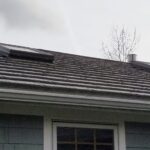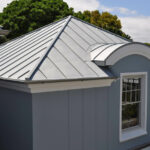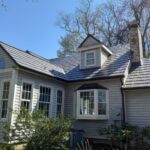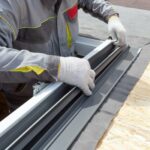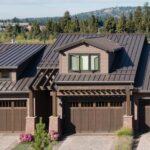Common Metal Roof Problems and Their Solutions
May 9, 2018 | By Mike Gonet | Filed under: Roofing
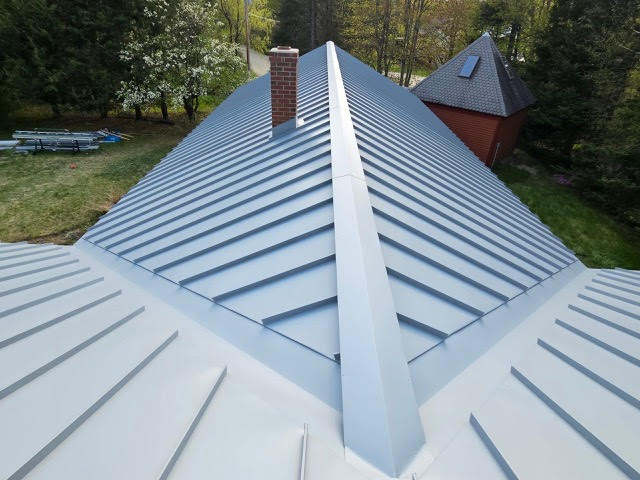
While metal roofs are durable, sturdy, and low-maintenance, they are not impenetrable or indestructible. Over time, especially if you don’t keep up with roofing maintenance, your metal roof can become damaged or corroded. You should inspect your metal roof seasonally by walking around the perimeter of your home and looking for problems. At Classic Metal Roofs, we are a family owned and operated residential metal roofing company in New England. We offer free roofing consultations and installations of metal roofs in MA, CT, NH, and RI.
Oil Canning
Oil canning, also called elastic buckling or stress wrinkling, can occur on any type of metal roof, including steel, aluminum, zinc, and copper. It occurs when a metal roof is over-stressed and can’t maintain a flat form, causing the metal to buckle and creating waves across the roofing structure. A roofing contractor can assess your roof and look for signs of oil canning. The primary causes of oil canning are:
- Over-stress or extreme pressure.
- Increased tension on the metal roofing panels.
- Poor handling or storage by roofing contractors.
- Inadequate space for thermal expansion and contraction.
- Improper installation by a metal roofing company or metal roofing contractor.
- Damage from cutting and roll-forming metal panels during the production process.
Leaking
All roofing is susceptible to leaks and holes. Even a metal roof can develop a leak due to wind, ice damming, structural damage, heavy rain or snow, or other inclement weather issues. A metal roof leak can also be caused by improper installation by a metal roofing contractor. A roofing contractor might cause the failure of the roofs’:
- Fasteners – Failed fasteners are screws that are too tight, too loose, or off-center, allowing water to leak in at the open spots created.
- Seams – A failed seam might be due to incorrectly formed or seamed metal roofing panels.
- Flashing – Failed flashing can cause leaks. Flashing is material added to reduce the risk of moisture affecting the joints or other additions on a roof, like the valleys, chimneys, or pipes. Flashing points that aren’t installed or fitted properly might buckle or allow moisture to enter.
- Sealant – Failed sealant or butyl tape will allow water, dirt, and other debris to compromise the structure of a metal roof.
- Details – If your metal roofing company uses inadequate details during the installation of your metal roof, there is an increased risk of roof leaks. Make sure the installation details are in line with manufacturer recommendations and their weather-tight warranty.
Scuffing & Scratching
A metal roof is also at risk of scuffing and scratching. The metal panels might be damaged before they even reach your home for installation. Surface damage can occur when roofing contractors or handlers are roll-forming or installing the roof, or when a manufacturer or distributor is transporting the metal roofing panels to the buyer. Your roofing contractor should check the metal panels before beginning installation. If a scratch or scuff is deep enough to reach the metal substrate of the panel, it shouldn’t be used during your installation. Roofing contractors, handlers, and distributors can reduce the risk of scuffing and scratching by:
- Handling coils with proper lifting devices.
- Avoiding carelessly walking on metal roofing panels.
- Protecting metal roofing panels from damage by tools or other items.
- Using edge guards to protect the metal roof edges during transportation.
- Maintaining roll-forming machines to protect components from malfunctioning.
- Properly coiling and recoiling the metal so it doesn’t rub together or strip the coating.
Corrosion
Metal roofs are protected from corrosion, rust, and degradation for decades. Most metal roofs have a corrosion-resistant protective paint, finish, or coating, but no system is perfect. Even metal roofs are susceptible to:
- Saltwater Corrosion – Installing a metal roof in a coastal area means your roof is at risk of saltwater corrosion.
- Using Dissimilar Metals – If your metal roofing company uses dissimilar metals for your metal roof installation, it might cause a negative reaction that results in corrosion.
- Cut Edges – Cut edges on a metal roof will cause edge creep or minimal rusting along the cut edge. Your roofing contractor can reduce this risk by installing lap flashing, a paint pen, or hemming exposed edges.
- Underside Corrosion – If metal roof panels aren’t properly coated on the underside, they are susceptible to corrosion. Moisture can get trapped underneath and weaken and corrode the metal. Your metal roof is also at risk of corrosion if your roofing contractor uses a granulated underlayment or installs a metal roof over shingles because the protective coating on the metal roof panels might get scratched off.
Chalking & Fading
Chalking is a white residue that appears on a painted or coated metal roof panel. It results from the breakdown of paint resin after prolonged UV exposure. Fading occurs when the paint’s pigment breaks down due to UV exposure, water, pollution, chemicals, or other exposure. Metal roofs are at risk of uneven fading, as different panels are exposed to different levels of UV rays or other substances. A metal roofing company easily fixes chalking and fading, which isn’t a dangerous or expensive roofing problem.
Schedule a Free Roofing Consultation
If you’re ready to schedule a free roofing consultation in New England, call or contact us online. Our experienced metal roofing contractors can thoroughly assess your roof, look for signs of damage, and help you find a lifetime, permanent metal roofing solution. We will never try to pressure you into paying for a product or service you don’t need. We have over 20 years of industry experience as a trusted metal roofing company and have roofed over 3,000 homes. We work hard to provide reliable, quality services for metal roofs in MA, CT, NH, and RI.
